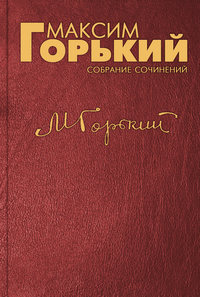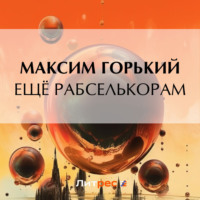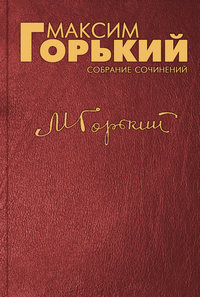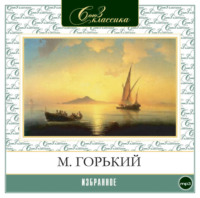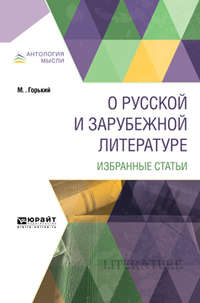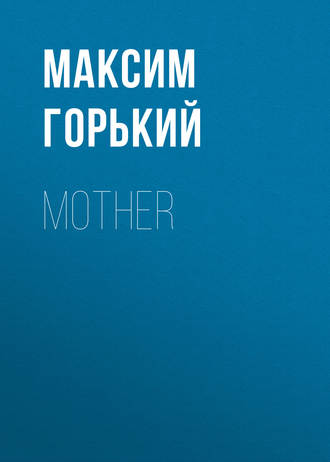 полная версия
полная версияMother
"Well, of course!" exclaimed Pavel, his brow contracting in a frown of disgust.
"In the bog everything smells of rottenness!" said the Little Russian with a sigh. "Why don't you, mother, explain to the foolish girls what it is to be married, so that they shouldn't be in such a hurry to get their bones broken?"
"Oh, well," said the mother, "they see the misery in store for them, they understand, but what can they do? They have no other choice!"
"It's a queer way they have of understanding, else they'd find a choice," observed Pavel.
The mother looked into his austere face.
"Why don't you teach them? Why don't you invite some of the cleverer ones?"
"That won't do!" the son replied dryly.
"Suppose we try?" said the Little Russian.
After a short silence Pavel said:
"Couples will be formed; couples will walk together; then some will get married, and that's all."
The mother became thoughtful. Pavel's austerity worried her. She saw that his advice was taken even by his older comrades, such as the Little Russian; but it seemed to her that all were afraid of him, and no one loved him because he was so stern.
Once when she had lain down to sleep, and her son and the Little Russian were still reading, she overheard their low conversation through the thin partition.
"You know I like Natasha," suddenly ejaculated the Little Russian in an undertone.
"I know," answered Pavel after a pause.
"Yes!"
The mother heard the Little Russian rise and begin to walk. The tread of his bare feet sounded on the floor, and a low, mournful whistle was heard. Then he spoke again:
"And does she notice it?"
Pavel was silent.
"What do you think?" the Little Russian asked, lowering his voice.
"She does," replied Pavel. "That's why she has refused to attend our meetings."
The Little Russian dragged his feet heavily over the floor, and again his low whistle quivered in the room. Then he asked:
"And if I tell her?"
"What?" The brief question shot from Pavel like the discharge of a gun.
"That I am – " began the Little Russian in a subdued voice.
"Why?" Pavel interrupted.
The mother heard the Little Russian stop, and she felt that he smiled.
"Yes, you see, I consider that if you love a girl you must tell her about it; else there'll be no sense to it!"
Pavel clapped the book shut with a bang.
"And what sense do you expect?"
Both were silent for a long while.
"Well?" asked the Little Russian.
"You must be clear in your mind, Andrey, as to what you want to do," said Pavel slowly. "Let us assume that she loves you, too – I do not think so, but let us assume it. Well, you get married. An interesting union – the intellectual with the workingman! Children come along; you will have to work all by yourself and very hard. Your life will become the ordinary life of a struggle for a piece of bread and a shelter for yourself and children. For the cause, you will become nonexistent, both of you!"
Silence ensued. Then Pavel began to speak again in a voice that sounded softer:
"You had better drop all this, Andrey. Keep quiet, and don't worry her. That's the more honest way."
"And do you remember what Alexey Ivanovich said about the necessity for a man to live a complete life – with all the power of his soul and body – do you remember?"
"That's not for us! How can you attain completion? It does not exist for you. If you love the future you must renounce everything in the present – everything, brother!"
"That's hard for a man!" said the Little Russian in a lowered voice.
"What else can be done? Think!"
The indifferent pendulum of the clock kept chopping off the seconds of life, calmly and precisely. At last the Little Russian said:
"Half the heart loves, and the other half hates! Is that a heart?"
"I ask you, what else can we do?"
The pages of a book rustled. Apparently Pavel had begun to read again. The mother lay with closed eyes, and was afraid to stir. She was ready to weep with pity for the Little Russian; but she was grieved still more for her son.
"My dear son! My consecrated one!" she thought.
Suddenly the Little Russian asked:
"So I am to keep quiet?"
"That's more honest, Andrey," answered Pavel softly.
"All right! That's the road we will travel." And in a few seconds he added, in a sad and subdued voice: "It will be hard for you, Pasha, when you get to that yourself."
"It is hard for me already."
"Yes?"
"Yes."
The wind brushed along the walls of the house, and the pendulum marked the passing time.
"Um," said the Little Russian leisurely, at last. "That's too bad."
The mother buried her head in the pillow and wept inaudibly.
In the morning Andrey seemed to her to be lower in stature and all the more winning. But her son towered thin, straight, and taciturn as ever. She had always called the Little Russian Andrey Stepanovich, in formal address, but now, all at once, involuntarily and unconsciously she said to him:
"Say, Andriusha, you had better get your boots mended. You are apt to catch cold."
"On pay day, mother, I'll buy myself a new pair," he answered, smiling. Then suddenly placing his long hand on her shoulder, he added: "You know, you are my real mother. Only you don't want to acknowledge it to people because I am so ugly."
She patted him on the hand without speaking. She would have liked to say many endearing things, but her heart was wrung with pity, and the words would not leave her tongue.
They spoke in the village about the socialists who distributed broadcast leaflets in blue ink. In these leaflets the conditions prevailing in the factory were trenchantly and pointedly depicted, as well as the strikes in St. Petersburg and southern Russia; and the workingmen were called upon to unite and fight for their interests.
The staid people who earned good pay waxed wroth as they read the literature, and said abusively: "Breeders of rebellion! For such business they ought to get their eyes blacked." And they carried the pamphlets to the office.
The young people read the proclamations eagerly, and said excitedly: "It's all true!"
The majority, broken down with their work, and indifferent to everything, said lazily: "Nothing will come of it. It is impossible!"
But the leaflets made a stir among the people, and when a week passed without their getting any, they said to one another:
"None again to-day! It seems the printing must have stopped."
Then on Monday the leaflets appeared again; and again there was a dull buzz of talk among the workingmen.
In the taverns and the factory strangers were noticed, men whom no one knew. They asked questions, scrutinized everything and everybody; looked around, ferreted about, and at once attracted universal attention, some by their suspicious watchfulness, others by their excessive obtrusiveness.
The mother knew that all this commotion was due to the work of her son Pavel. She saw how all the people were drawn together about him. He was not alone, and therefore it was not so dangerous. But pride in her son mingled with her apprehension for his fate; it was his secret labors that discharged themselves in fresh currents into the narrow, turbid stream of life.
One evening Marya Korsunova rapped at the window from the street, and when the mother opened it, she said in a loud whisper:
"Now, take care, Pelagueya; the boys have gotten themselves into a nice mess! It's been decided to make a search to-night in your house, and Mazin's and Vyesovshchikov's – "
The mother heard only the beginning of the woman's talk; all the rest of the words flowed together in one stream of ill-boding, hoarse sounds.
Marya's thick lips flapped hastily one against the other. Snorts issued from her fleshy nose, her eyes blinked and turned from side to side as if on the lookout for somebody in the street.
"And, mark you, I do not know anything, and I did not say anything to you, mother dear, and did not even see you to-day, you understand?"
Then she disappeared.
The mother closed the window and slowly dropped on a chair, her strength gone from her, her brain a desolate void. But the consciousness of the danger threatening her son quickly brought her to her feet again. She dressed hastily, for some reason wrapped her shawl tightly around her head, and ran to Fedya Mazin, who, she knew, was sick and not working. She found him sitting at the window reading a book, and moving his right hand to and fro with his left, his thumb spread out. On learning the news he jumped up nervously, his lips trembled, and his face paled.
"There you are! And I have an abscess on my finger!" he mumbled.
"What are we to do?" asked Vlasova, wiping the perspiration from her face with a hand that trembled nervously.
"Wait a while! Don't be afraid," answered Fedya, running his sound hand through his curly hair.
"But you are afraid yourself!"
"I?" He reddened and smiled in embarrassment. "Yes – h-m – I had a fit of cowardice, the devil take it! We must let Pavel know. I'll send my little sister to him. You go home. Never mind! They're not going to beat us."
On returning home she gathered together all the books, and pressing them to her bosom walked about the house for a long time, looking into the oven, under the oven, into the pipe of the samovar, and even into the water vat. She thought Pavel would at once drop work and come home; but he did not come. Finally she sat down exhausted on the bench in the kitchen, putting the books under her; and she remained in that position, afraid to rise, until Pavel and the Little Russian returned from the factory.
"Do you know?" she exclaimed without rising.
"We know!" said Pavel with a composed smile. "Are you afraid?"
"Oh, I'm so afraid, so afraid!"
"You needn't be afraid," said the Little Russian. "That won't help anybody."
"Didn't even prepare the samovar," remarked Pavel.
The mother rose, and pointed to the books with a guilty air.
"You see, it was on account of them – all the time – I was – "
The son and the Little Russian burst into laughter; and this relieved her. Then Pavel picked out some books and carried them out into the yard to hide them, while the Little Russian remained to prepare the samovar.
"There's nothing terrible at all in this, mother. It's only a shame for people to occupy themselves with such nonsense. Grown-up men in gray come in with sabers at their sides, with spurs on their feet, and rummage around, and dig up and search everything. They look under the bed, and climb up to the garret; if there is a cellar they crawl down into it. The cobwebs get on their faces, and they puff and snort. They are bored and ashamed. That's why they put on the appearance of being very wicked and very mad with us. It's dirty work, and they understand it, of course they do! Once they turned everything topsy-turvy in my place, and went away abashed, that's all. Another time they took me along with them. Well, they put me in prison, and I stayed there with them for about four months. You sit and sit, then you're called out, taken to the street under an escort of soldiers, and you're asked certain questions. They're stupid people, they talk such incoherent stuff. When they're done with you, they tell the soldiers to take you back to prison. So they lead you here, and they lead you there – they've got to justify their salaries somehow. And then they let you go free. That's all."
"How you always do speak, Andriusha!" exclaimed the mother involuntarily.
Kneeling before the samovar he diligently blew into the pipe; but presently he turned his face, red with exertion, toward her, and smoothing his mustache with both hands inquired:
"And how do I speak, pray?"
"As if nobody had ever done you any wrong."
He rose, approached her, and shaking his head, said:
"Is there an unwronged soul anywhere in the wide world? But I have been wronged so much that I have ceased to feel wronged. What's to be done if people cannot help acting as they do? The wrongs I undergo hinder me greatly in my work. It is impossible to avoid them. But to stop and pay attention to them is useless waste of time. Such a life! Formerly I would occasionally get angry – but I thought to myself: all around me I see people broken in heart. It seemed as if each one were afraid that his neighbor would strike him, and so he tried to get ahead and strike the other first. Such a life it is, mother dear."
His speech flowed on serenely. He resolutely distracted her mind from alarm at the expected police search. His luminous, protuberant eyes smiled sadly. Though ungainly, he seemed made of stuff that bends but never breaks.
The mother sighed and uttered the warm wish:
"May God grant you happiness, Andriusha!"
The Little Russian stalked to the samovar with long strides, sat in front of it again on his heels, and mumbled:
"If he gives me happiness, I will not decline it; ask for it I won't, to seek it I have no time."
And he began to whistle.
Pavel came in from the yard and said confidently:
"They won't find them!" He started to wash himself. Then carefully rubbing his hands dry, he added: "If you show them, mother, that you are frightened, they will think there must be something in this house because you tremble. And we have done nothing as yet, nothing! You know that we don't want anything bad; on our side is truth, and we will work for it all our lives. This is our entire guilt. Why, then, need we fear?"
"I will pull myself together, Pasha!" she assured him. And the next moment, unable to repress her anxiety, she exclaimed: "I wish they'd come soon, and it would all be over!"
But they did not come that night, and in the morning, in anticipation of the fun that would probably be poked at her for her alarm, the mother began to joke at herself.
CHAPTER VI
The searchers appeared at the very time they were not expected, nearly a month after this anxious night. Nikolay Vyesovshchikov was at Pavel's house talking with him and Andrey about their newspaper. It was late, about midnight. The mother was already in bed. Half awake, half asleep, she listened to the low, busy voices. Presently Andrey got up and carefully picked his way through and out of the kitchen, quietly shutting the door after him. The noise of the iron bucket was heard on the porch. Suddenly the door was flung wide open; the Little Russian entered the kitchen, and announced in a loud whisper:
"I hear the jingling of spurs in the street!"
The mother jumped out of bed, catching at her dress with a trembling hand; but Pavel came to the door and said calmly:
"You stay in bed; you're not feeling well."
A cautious, stealthy sound was heard on the porch. Pavel went to the door and knocking at it with his hand asked:
"Who's there?"
A tall, gray figure tumultuously precipitated itself through the doorway; after it another; two gendarmes pushed Pavel back, and stationed themselves on either side of him, and a loud mocking voice called out:
"No one you expect, eh?"
The words came from a tall, lank officer, with a thin, black mustache. The village policeman, Fedyakin, appeared at the bedside of the mother, and, raising one hand to his cap, pointed the other at her face and, making terrible eyes, said:
"This is his mother, your honor!" Then, waving his hand toward Pavel: "And this is he himself."
"Pavel Vlasov?" inquired the officer, screwing up his eyes; and when Pavel silently nodded his head, he announced, twirling his mustache:
"I have to make a search in your house. Get up, old woman!"
"Who is there?" he asked, turning suddenly and making a dash for the door.
"Your name?" His voice was heard from the other room.
Two other men came in from the porch: the old smelter Tveryakov and his lodger, the stoker Rybin, a staid, dark-colored peasant. He said in a thick, loud voice:
"Good evening, Nilovna."
She dressed herself, all the while speaking to herself in a low voice, so as to give herself courage:
"What sort of a thing is this? They come at night. People are asleep and they come – "
The room was close, and for some reason smelled strongly of shoe blacking. Two gendarmes and the village police commissioner, Ryskin, their heavy tread resounding on the floor, removed the books from the shelves and put them on the table before the officer. Two others rapped on the walls with their fists, and looked under the chairs. One man clumsily clambered up on the stove in the corner. Nikolay's pockmarked face became covered with red patches, and his little gray eyes were steadfastly fixed upon the officer. The Little Russian curled his mustache, and when the mother entered the room, he smiled and gave her an affectionate nod of the head.
Striving to suppress her fear, she walked, not sideways as always, but erect, her chest thrown out, which gave her figure a droll, stilted air of importance. Her shoes made a knocking sound on the floor, and her brows trembled.
The officer quickly seized the books with the long fingers of his white hand, turned over the pages, shook them, and with a dexterous movement of the wrist flung them aside. Sometimes a book fell to the floor with a light thud. All were silent. The heavy breathing of the perspiring gendarmes was audible; the spurs clanked, and sometimes the low question was heard: "Did you look here?"
The mother stood by Pavel's side against the wall. She folded her arms over her bosom, like her son, and both regarded the officer. The mother felt her knees trembling, and her eyes became covered with a dry mist.
Suddenly the piercing voice of Nikolay cut into the silence:
"Why is it necessary to throw the books on the floor?"
The mother trembled. Tveryakov rocked his head as if he had been struck on the back. Rybin uttered a peculiar cluck, and regarded Nikolay attentively.
The officer threw up his head, screwed up his eyes, and fixed them for a second upon the pockmarked, mottled, immobile face. His fingers began to turn the leaves of the books still more rapidly. His face was yellow and pale; he twisted his lips continually. At times he opened his large gray eyes wide, as if he suffered from an intolerable pain, and was ready to scream out in impotent anguish.
"Soldier!" Vyesovshchikov called out again. "Pick the books up!"
All the gendarmes turned their eyes on him, then looked at the officer. He again raised his head, and taking in the broad figure of Nikolay with a searching stare, he drawled:
"Well, well, pick up the books."
One gendarme bent down, and, looking slantwise at Vyesovshchikov, began to collect the books scattered on the floor.
"Why doesn't Nikolay keep quiet?" the mother whispered to Pavel. He shrugged his shoulders. The Little Russian drooped his head.
"What's the whispering there? Silence, please! Who reads the Bible?"
"I!" said Pavel.
"Aha! And whose books are all these?"
"Mine!" answered Pavel.
"So!" exclaimed the officer, throwing himself on the back of the chair. He made the bones of his slender hand crack, stretched his legs under the table, and adjusting his mustache, asked Nikolay: "Are you Andrey Nakhodka?"
"Yes!" answered Nikolay, moving forward. The Little Russian put out his hand, took him by the shoulder, and pulled him back.
"He made a mistake; I am Andrey!"
The officer raised his hand, and threatening Vyesovshchikov with his little finger, said:
"Take care!"
He began to search among his papers. From the street the bright, moonlit night looked on through the window with soulless eyes. Some one was loafing about outside the window, and the snow crunched under his tread.
"You, Nakhodka, you have been searched for political offenses before?" asked the officer.
"Yes, I was searched in Rostov and Saratov. Only there the gendarmes addressed me as 'Mr.'"
The officer winked his right eye, rubbed it, and showing his fine teeth, said:
"And do you happen to know, Mr. Nakhodka – yes, you, Mr. Nakhodka – who those scoundrels are who distribute criminal proclamations and books in the factory, eh?"
The Little Russian swayed his body, and with a broad smile on his face was about to say something, when the irritating voice of Nikolay again rang out:
"This is the first time we have seen scoundrels here!"
Silence ensued. There was a moment of breathless suspense. The scar on the mother's face whitened, and her right eyebrow traveled upward. Rybin's black beard quivered strangely. He dropped his eyes, and slowly scratched one hand with the other.
"Take this dog out of here!" said the officer.
Two gendarmes seized Nikolay under the arm and rudely pulled him into the kitchen. There he planted his feet firmly on the floor and shouted:
"Stop! I am going to put my coat on."
The police commissioner came in from the yard and said:
"There is nothing out there. We searched everywhere!"
"Well, of course!" exclaimed the officer, laughing. "I knew it! There's an experienced man here, it goes without saying."
The mother listened to his thin, dry voice, and looking with terror into the yellow face, felt an enemy in this man, an enemy without pity, with a heart full of aristocratic disdain of the people. Formerly she had but rarely seen such persons, and now she had almost forgotten they existed.
"Then this is the man whom Pavel and his friends have provoked," she thought.
"I place you, Mr. Andrey Onisimov Nakhodka, under arrest."
"What for?" asked the Little Russian composedly.
"I will tell you later!" answered the officer with spiteful civility, and turning to Vlasova, he shouted:
"Say, can you read or write?"
"No!" answered Pavel.
"I didn't ask you!" said the officer sternly, and repeated: "Say, old woman, can you read or write?"
The mother involuntarily gave way to a feeling of hatred for the man. She was seized with a sudden fit of trembling, as if she had jumped into cold water. She straightened herself, her scar turned purple, and her brow drooped low.
"Don't shout!" she said, flinging out her hand toward him. "You are a young man still; you don't know misery or sorrow – "
"Calm yourself, mother!" Pavel intervened.
"In this business, mother, you've got to take your heart between your teeth and hold it there tight," said the Little Russian.
"Wait a moment, Pasha!" cried the mother, rushing to the table and then addressing the officer: "Why do you snatch people away thus?"
"That does not concern you. Silence!" shouted the officer, rising.
"Bring in the prisoner Vyesovshchikov!" he commanded, and began to read aloud a document which he raised to his face.
Nikolay was brought into the room.
"Hats off!" shouted the officer, interrupting his reading.
Rybin went up to Vlasova, and patting her on the back, said in an undertone:
"Don't get excited, mother!"
"How can I take my hat off if they hold my hands?" asked Nikolay, drowning the reading.
The officer flung the paper on the table.
"Sign!" he said curtly.
The mother saw how everyone signed the document, and her excitement died down, a softer feeling taking possession of her heart. Her eyes filled with tears – burning tears of insult and impotence – such tears she had wept for twenty years of her married life, but lately she had almost forgotten their acid, heart-corroding taste.
The officer regarded her contemptuously. He scowled and remarked:
"You bawl ahead of time, my lady! Look out, or you won't have tears left for the future!"
"A mother has enough tears for everything, everything! If you have a mother, she knows it!"
The officer hastily put the papers into his new portfolio with its shining lock.
"How independent they all are in your place!" He turned to the police commissioner.
"An impudent pack!" mumbled the commissioner.
"March!" commanded the officer.
"Good-by, Andrey! Good-by, Nikolay!" said Pavel warmly and softly, pressing his comrades' hands.
"That's it! Until we meet again!" the officer scoffed.
Vyesovshchikov silently pressed Pavel's hands with his short fingers and breathed heavily. The blood mounted to his thick neck; his eyes flashed with rancor. The Little Russian's face beamed with a sunny smile. He nodded his head, and said something to the mother; she made the sign of the cross over him.


